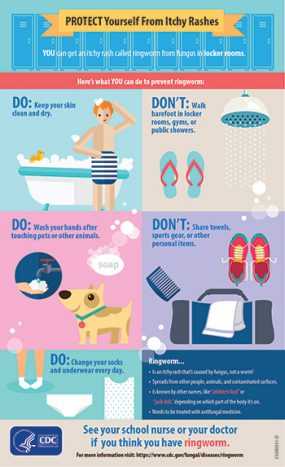Ringworm Risk & Prevention
Who gets ringworm?
Ringworm is very common. Anyone can get ringworm, but people who have weakened immune systems may be especially at risk for infection and may have problems fighting off a ringworm infection.1 People who use public showers or locker rooms, athletes (particularly those who are involved in contact sports such as wrestling),2–4 people who wear tight shoes and have excessive sweating, and people who have close contact with animals may also be more likely to come in contact with the fungi that cause ringworm.
How can I prevent ringworm?
- Keep your skin clean and dry.
- Wear shoes that allow air to circulate freely around your feet.
- Don’t walk barefoot in areas like locker rooms or public showers.
- Clip your fingernails and toenails short and keep them clean.
- Change your socks and underwear at least once a day.
- Don’t share clothing, towels, sheets, or other personal items with someone who has ringworm.
- Wash your hands with soap and running water after playing with pets. If you suspect that your pet has ringworm, take it to see a veterinarian. If your pet has ringworm, follow the steps below to prevent spreading the infection.
- If you’re an athlete involved in close contact sports, shower immediately after your practice session or match, and keep all of your sports gear and uniform clean. Don’t share sports gear (helmet, etc.) with other players.
My pet has ringworm and I’m worried about ringworm in my house. What should I do?
Ringworm can easily transfer from animals to humans.5 You can take the following steps to protect yourself and your pet:
For people
Do
- Wash your hands with soap and running water after playing with or petting your pet.
- Wear gloves and long sleeves if you must handle animals with ringworm, and always wash your hands after handling the animal.
- Vacuum the areas of the home that the infected pet commonly visits. This will help to remove infected fur or flakes of skin.
- Disinfect areas the pet has spent time in, including surfaces and bedding.
- The spores of this fungus can be killed with common disinfectants like diluted chlorine bleach (1/4 c per gallon water), benzalkonium chloride, or strong detergents.
- Never mix cleaning products. This may cause harmful gases.
Do not handle animals with ringworm if your immune system is weak in any way (if you have HIV/AIDS, are undergoing cancer treatment, or are taking medications that suppress the immune system, for example).
For pets
Protect your pet’s health
- If you suspect that your pet has ringworm, make sure it is seen by a veterinarian so treatment can be started.
- If one of your pets has ringworm, make sure you have every pet in the household checked for ringworm infection.
Please click here for more information about pets and ringworm.
Please click here for information about how to stay healthy at petting zoos and other animal exhibits.
There’s a ringworm outbreak in my child’s school/daycare center. What should I do?
- Contact your local health department for more information.
- Tell your child not to share personal items, such as clothing, hairbrushes, and hats, with other people.
- Take your child to see a pediatrician if he or she develops ringworm symptoms.
- Check with your child’s school or daycare to see if he or she can still attend classes or participate in athletics.
References
- Crissey JT, Lang H, Parish LC. Manual of Medical Mycology, Blackwell Science, Cambridge 1995. p.36.
- Wilson EK, Deweber K, Berry JW, Wilckens JH. Cutaneous infections in wrestlers. Sports health 2013;5:423-37.
- Pecci M, Comeau D, Chawla V. Skin conditions in the athlete. Am J Sports Med 2009;37:406-18.
- Pickup TL, Adams BB. Prevalence of tinea pedis in professional and college soccer players versus non-athletes. Clin J Sport Med 2007;17:52-4.
- Kaplan W. Epidemiology and public health significance of ringworm in animals. Arch Dermatol. 1967 Oct;96(4):404-8.
- Page last reviewed: December 6, 2015
- Page last updated: August 16, 2017
- Content source:


 ShareCompartir
ShareCompartir
